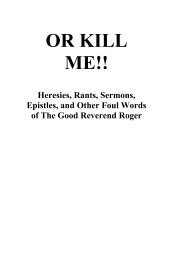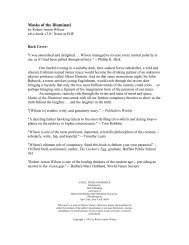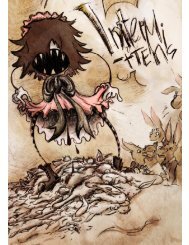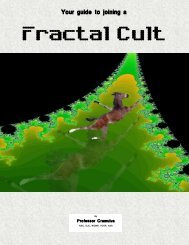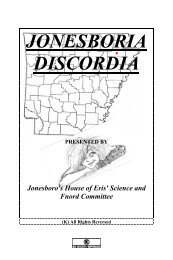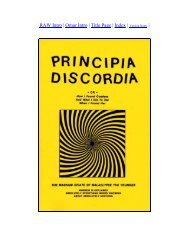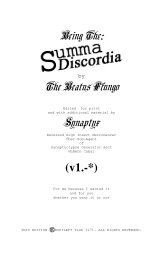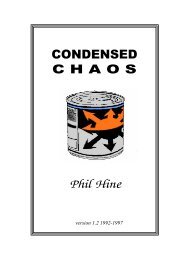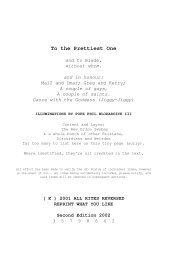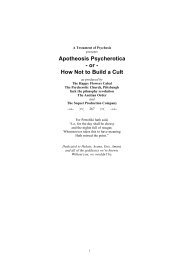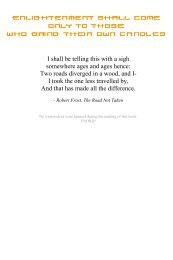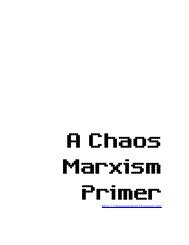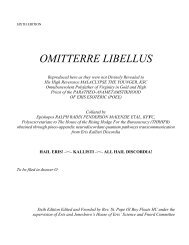Coincidance - Principia Discordia
Coincidance - Principia Discordia
Coincidance - Principia Discordia
You also want an ePaper? Increase the reach of your titles
YUMPU automatically turns print PDFs into web optimized ePapers that Google loves.
COINCIDANCE 177<br />
in Paris for a Human Rights conference, jetted to Wales for a conference on<br />
the effects of satellite TV on local cultures, and spoke in Dublin at a rally of<br />
Irish pacifists planning demonstrations against Ronald Reagan, then visiting<br />
Ireland. Looking over his Vita, I found that he still serves as President of the<br />
Irish sections of Amnesty International (he was Chairman of the international<br />
Executive Committee of Amnesty, 1961-74) and is also President of the<br />
Nuclear Safety Association, Vice-Chairman of the Irish Civil Liberties<br />
Associations, President of the Irish Campaign for Nuclear Disarmament,<br />
President of the UNESCO Commission for the Study of Communication,<br />
President of the International Peace Bureau and serves more than a dozen<br />
similar posts, including President of the Literary and Historical Association<br />
of University College Dublin, member of the Foundation for the Prevention<br />
of Childhood Handicaps and even Vice-President of the "Trees for Ireland"<br />
Association, a reforestation group. The taxi-driver who took me to<br />
MacBride's home in Clonskea, a Dublin suburb, told me he once asked<br />
MacBride, "How can you keep so busy at your age?" MacBride answered<br />
with typical Irish self-mockery, "If I quit now, who'd pay the bills?"<br />
Actually, Sean MacBride has been extremely active—an engage, as the<br />
French say—since he joined the I.R.A. in 1919, at the age of fifteen. He had<br />
already been imprisoned by then, at fourteen, as a suspected revolutionary<br />
(he quickly escaped) because his father, Major John MacBride, one of the<br />
leaders of the Easter Uprising in Dublin, 1916, had been executed by the<br />
British. (Sean's mother, Maud Gonne MacBride, although best known to<br />
students of literature as the inspiration of some of the poetry of William<br />
Butler Yeats, is best known in Ireland as an often-imprisoned leader in the<br />
struggle of the Irish peasants against English absentee landlords.) At<br />
sixteen, in 1921, Sean was one of the I.R.A. delegates to the Frankfurt<br />
Congress Against Imperialism, where he met Nehru and Ho Chih Minh; it<br />
was there that he began to see Ireland as part of the Third World, an idea<br />
that he retains to this day. ("We are an undeveloped country, a part of the<br />
Third World," he said in a recent speech, "no matter how much the smart<br />
young executives pretend that we are a sophisticated, developed economy.")<br />
At seventeen, in 1921, Sean MacBride was the youngest member of the<br />
Irish delegation to the London Treaty Conference which ended the Irish<br />
War of Liberation on terms he still finds unacceptable. He therefore<br />
remained in the Irish Republican Army during the Civil War that followed<br />
and was imprisoned by the Irish Free State in 1922 and again in 1930;<br />
ironically, the Free State eventually became the Republic of Ireland which<br />
gave him a medal in 1938 for his 1919-1921 military activities against the<br />
British, elected him to Dail hEirann (roughly, the House of Representatives)<br />
in 1947-58, and made him Minister of External Affairs in 1948-51. "He



